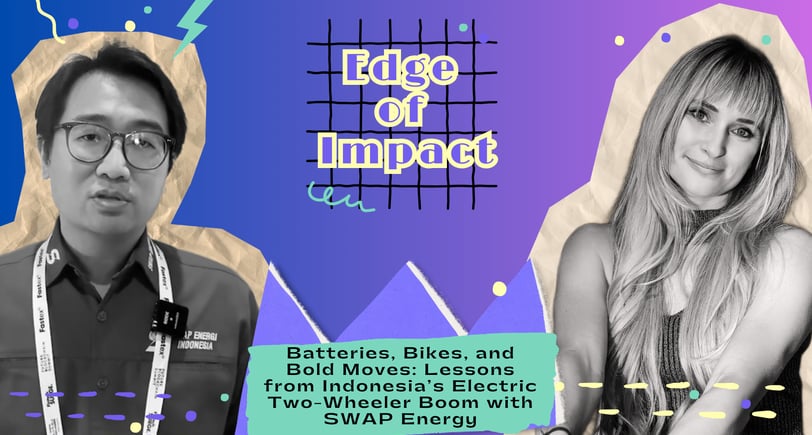#7 Batteries, Bikes, and Bold Moves: Lessons from Indonesia’s Electric Two-Wheeler Boom with SWAP Energy
Kevin, a serial entrepreneur, turned personal frustrations with electric scooters into a thriving business, co-founding SWAP Energy to bring battery-swapping stations to Indonesia’s bustling two-wheeler market. From bootstrapping mock-ups to scaling to now 1,500 stations, his journey is a masterclass in learning from chaos - think software crashes, customer protests, and a relentless drive to improve. Partnering with giants like Grab and Shell, SWAP now powers 18,000 bikes, cutting costs for drivers and reshaping daily mobility. This is the story of bold moves, human impact, and why failure is just tuition for success.
PODCAST
Odeta Ise
4/10/20255 min read


Let's dive into the Insight, Inspiration & Impact behind SWAP Energy with Kevin Phang
Follow & Support SWAP Energy
WSA Winning Year: 2022
Award: The World Summit Award
Category: Environment & Green Energy
Founders: Irwan Tjahaja, Kevin Phang Wijaya, Thomson Djuraiman
Country: Indonesia
On WSA website: https://wsa-global.org/winner/swap-energy/
Picture a world where chaos fuels progress. Where every stumble becomes a stepping stone. That’s the world Kevin lives in, a serial entrepreneur whose journey with SWAP Energy is transforming Indonesia’s roads, one battery swap at a time. His story isn’t about grand plans to save the planet. It’s about solving real problems with grit, ingenuity, and a willingness to learn the hard way.
A Spark from Struggle
Kevin’s path began with a personal headache. Back in 2008, as a student in China, he relied on a small electric scooter to zip between home and school. The convenience faded fast. Charging meant wrestling for plugs in parking lots, dodging thieves who’d unplug his cord, and waiting hours for a lead-acid battery to juice up. One day, an overcharged battery exploded in an apartment, triggering a ban on home charging. Stranded, Kevin had to push his scooter home on foot. That frustration stuck with him. “I kept thinking, there’s got to be a better way,” he recalls. Years later, in 2019, that nagging thought met opportunity when he teamed up with a co-founder running a power bank rental business in China. They wondered: could swapping batteries work for electric bikes, just like renting power banks at a station?
Insight Takes Shape in Indonesia
Indonesia offered the perfect testing ground. With 130 million two-wheelers on the road, it’s the world’s second-largest market for them, trailing only India. Here, bikes aren’t just for short trips. They’re lifelines for daily commutes, ride-hailing, and logistics, racking up 40 to 150 kilometers a day. Gas stations are a ritual, public transport lags, and traffic snarls everything. Kevin and his co-founder saw the catch: electric bikes with fixed batteries couldn’t keep up. Charging took four hours, fast chargers overwhelmed the country’s modest 450 to 1300 watt home grids, and battery replacement costs spooked buyers used to reselling gas bikes. Their solution? Swapping. “We decided the battery shouldn’t belong to the customer. It’s ours,” Kevin explains. By owning the batteries and offering a subscription model, SWAP Energy cut charging delays, erased replacement worries, and made electricity cheaper than gasoline. Drawing from Taiwan’s Gogoro system and their power bank know-how, they kicked off in late 2019, bootstrapping a three-slot swapping station mock-up and aiming to reshape mobility.
Learning Through the Mess
The early days tested their resolve. In 2020, they pitched their swapping system to major motorcycle brands. Doors slammed shut. “They thought it was too risky,” Kevin says. Undaunted, they launched their own electric bike brand in 2021, rolling out 50 swapping stations across Jakarta. Customers liked the idea but hesitated. “It’s cool, but there’s no station near me,” they’d say. So SWAP scaled up, hitting 300 stations, then 700 by 2022, and 1400 today, making it Southeast Asia’s largest swapping network. Growth came with hiccups. COVID slowed them. A software glitch once crashed 5000 bikes, sparking a week-long recall frenzy. Another time, their server buckled, and 200 people protested outside their showroom. “I’ve paid a lot of tuition fees,” Kevin laughs, turning setbacks into lessons. Each bump sharpened their edge: software now boasts a 99.99 percent swap success rate, stations grew to eight slots, and an app tracks availability in real time.
Bold Moves Pay Off
Placing swapping stations took guts. Kevin tapped angel investor connections to pitch giants like Shell, Pertamina, Circle K, and Grab, Southeast Asia’s ride-hailing leader. Early deals meant paying monthly fees, $50 here, $20 there. As stations multiplied and users surged, terms shifted to profit-sharing. Today, 200 dealers sell SWAP bikes, and partnerships with ride-hailing and logistics firms fuel a network powering 18000 motorcycles. “It’s a monopoly game,” Kevin says. “You need scale, 5000 or 10000 stations, to win.” The real win shines on the ground. Ride-hailing drivers earning $20 daily once spent $7 on gas. With SWAP bikes, that drops to $3.50, leaving $3 more for their families. “That’s what excites me,” Kevin beams. “They’re happier, no noise, no vibration, just smooth rides.” An unlimited daily swap package soared to 60 percent of sales in six weeks, freeing drivers from mileage limits.
Impact Meets Pragmatism
Indonesia’s government backs the shift, offering $500 subsidies per bike to cut gasoline costs and meet G20 emission goals. Kevin knows climate isn’t the hook. “People don’t care about emissions. They want cheaper, easier rides,” he says. His focus stays on solving their problems first, weaving in carbon education later. It’s a practical balance between local needs and bigger goals. Funny moments pop up too: wives track husbands via the app’s GPS, one guy swapped batteries 10 times a day with a stopwatch to test the “nine-second” claim. Yet the 100 daily complaint calls keep Kevin grounded. “99.99 percent isn’t enough,” he insists, still picking up the phone to tweak the product.
Wisdom from the Wave
Kevin’s no stranger to stumbles. Past startups in advertising, Bitcoin, and hydroponics all folded. He sees it as leveling up. “If you’re not failing, you’re not trying hard enough,” he tells entrepreneurs. “Life’s a long game. Keep riding the wave.” Asked what he’d change with a magic wand, he pauses. “Nothing. The chaos taught us to grow.” Now, SWAP eyes 5000 stations and beyond, betting on a 30-year run. Self-driving bikes? “Not in Indonesia’s traffic,” he chuckles. Four-wheelers, maybe. For now, Kevin’s surfing the mess, proving batteries, bikes, and bold moves can change lives, one swap at a time.









